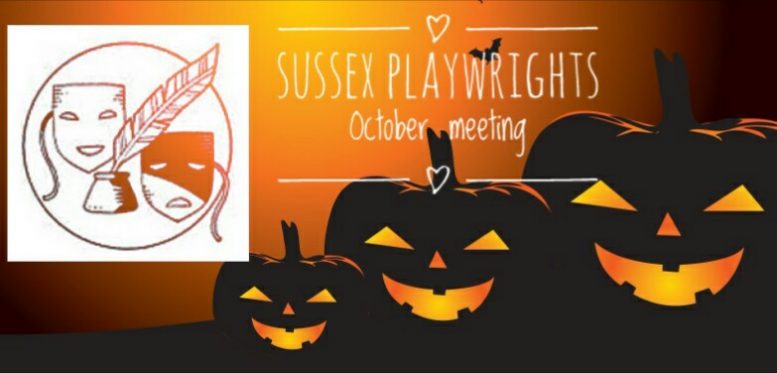

Sussex Playwrights October 2018
‘TBC Audio was back. To those who don’t know him, Moorhead is a force SPC have enjoyed working with for now nearly two years.
As producer/director of TBC Audio Moorhead was back to introduce some exceptionally spooked readings that are about to get canned. That is, Moorhead’s production team with cast, crew, recording studios and audio-podcasts that are now amongst the 10% most-listened to in the UK. And that doesn’t even take into account the rest of the world where in fact TBC Audio garners most of its loyal listeners. Sussex-based, it’s a new force pulling in a range of new and experienced writers, several of whom have worked with Moorhead at the BBC.
Enough puff. Moorhead introduced a new strand and orientation for TBC. The Other 1% has concentrated on the unexplained 1% of phenomena that can’t be explained away, whether psychic, alien or sci-fi dystopia.
In particular he’s revisiting a work he was involved with in his early BBC days, Threads from 1984. This dealt in literally blistering detail with the aftermath of a nuclear strike, When the Wind Blows for adults, very much a miasma in the air in the time.
He’s commissioned a series of Zero Plus Days, the first of which by Simon Jenner Zero Plus 120, Farmer, read by Philippa Hammond I can’t possibly comment on save to comment on how consummately Hammond realised the de-humanized farmer’s shaft of humanity after a gruff of brutally realist touches. She’s already recorded it and it was a delight to hear this pitch-perfect Sussex drawl re-enacted by Hammond, who’s sovereign in such roles – an apparent ‘coping’ mechanism riven by humanity.
Moorhead commissioned Jenner to work with Gareth Strachan and Alison Fisher on writing a Zero Plus 1000 Years series which Jenner will kick off with.
Strachan was up next. His Zero Plus Seven, a postman, something Strachan has been, was acted with studied, bleached out conscience by Russell Shaw. Shaw brought a gravitas – perhaps it was just a touch too slow in parts – that showed his immersion in the subject. He actually revisited Threads, and rarely has something sounded as death-haunted as here. Shaw immersed himself in a superbly disjunct relation of a man commanded to shoot looters – his royal warrant meaning he must or be shot himself, an ingenious recognition of ancient writ – and how he’s forced to shoot old friends, lovers even, in a display of self-destruction that’s like PTSD in both slow-motion and super-quick at just over ten minutes, the commissioned length of these pieces. Throughout, Moorhead supplied the gunshots and actual bullets on display. I might have done with a couple less gunshots but make no mistake, this was gripping and left a great sunk silence for several seconds.
Discussions after took the form of how this inhumanity visited such individuals and left everyone keen to hear the recordings and indeed more of the same. Moorhead will be back in January, but Strachan will return with another piece in December’.
Simon Jenner
‘Philippa Hammond performed a reading of this new short monologue, which is part of the ‘Protect and Survive’ audio series, currently in production by TBC Audio, produced by Simon Moorhead. 120 days after a nuclear strike on Britain, a tenacious and resourceful farmer holds on and tries to survive, despite losing family members to radiation sickness. The Downs are no longer fit to grow vegetables or crops and the pigs are being reared on the only food available to them – the rotting human corpses that litter the countryside. Piglets are being born with two heads, but as the farmer ruefully remarks, in a time of famine “two heads are better than one.” Audience members remarked on the accuracy of the grim circumstances depicted, being similar to events reported after the Chernobyl nuclear disaster. Simon Jenner’s writing was visceral and bleak, yet also poetic and lyrical. Delivered by Philippa in a stoical, light Dorset burr, it reminded me of the scenes of harsh winter harvesting in Thomas Hardy’s ‘Tess Of The D’Urbervilles’.
Judy Upton